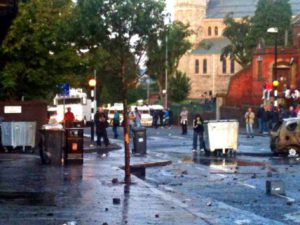Gli organi di informazione devono consegnare alla polizia tutti i filmati mai trasmessi sui disordini di Belfast

Secondo il giudice potrebbe esserci una forte possibilità di identificare i rivoltosi e di mandarli in tribunale.
Gli avvocati delle emittenti televisive si erano opposti alla richiesta della PSNI, sostenendo che potrebbe aumentare il rischio per la sicurezza delle troupe televisive e dei giornalisti.
Hanno sostenuto che i giornalisti potrebbero essere visti come una specie di informatori della polizia e questo ostacolerebbe la capacità di svolgere il proprio lavoro.
La polizia aveva chiesto alle emittenti televisive ed alle agenzie di stampa i filmati e le fotografie delle violenze avvenute a North e West Belfast l’11, 12 e 13 luglio scorso.
Veicoli sequestrati furono dati alle fiamme e i danni ammontarono a migliaia di sterline.
Oltre 40 agenti rimasero feriti quando la folla ha attaccato le linee della polizia con bombe molotov e altri oggetti.
Il caso è incentrato sulle rivendicazioni tra l’interesse pubblico alla condanna dei violenti e la minaccia alla libertà di stampa.
Perseguiti con successo
Un sergente investigatore incaricato di coordinare la raccolta delle prove ha riferito in tribunale a Belfast che un filmato mai trasmesso poteva avere un valore sostanziale.
Il materiale rilasciato dai media in seguito ad una richiesta simile avvenuta dopo i disordini della scorsa estate fu decisivo in 15 azioni penali.
Pronunciandosi sulla richiesta, il giudice Grant ha respinto le accuse secondo cui si trattava solo di “una battuta di pesca” da parte della polizia.
Ha detto: “C’è un interesse pubblico assolutamente legittimo nella rilevazione del crimine, nell’individuazione di coloro che sono impegnati in attività criminali, nonché l’applicazione e la condanna delle persone coinvolte.
“Così facendo, la popolazione riceverà un notevole grado di protezione”.
Il giudice ha sottolineato che non ci sono prove di una minaccia maggiore per i giornalisti avvenuta dopo la consegna di altri filmati simili.
Ha aggiunto: “Sono pienamente soddisfatto perché vi è una forte probabilità che il materiale abbia il potenziale di identificare coloro che sono impegnati in queste attività molto gravi e pericolose… che tale materiale esista.
“In base alle circostanze ordino la divulgazione del materiale ricercato nella domanda”.
In una dichiarazione, la BBC si è dichiarata dalla sentenza.
“Il nostro tentativo di opporci alla domanda della polizia per il materiale mai andato in onda era per garantire l’indipendenza e la sicurezza dei giornalisti e delle troupe televisive, mentre lavorano durante i disordini – spesso in circostanze difficili”.
Tratto da BBC News
News organisations must hand over riot footage
News organisations must hand over to police all unseen footage of last month’s rioting in Belfast.
He said there was a strong chance it could help identify troublemakers and secure convictions.
Lawyers for broadcasters had opposed the PSNI application arguing it could heighten the risk to the safety of camera crews and reporters.
They argued that journalists could be seen to be police evidence gatherers and hamper their ability to do their job.
Police had sought footage and photographs from broadcasters and news agencies of the violence in parts of north and west Belfast on 11, 12 and 13 July.
Hijacked vehicles were set on fire and thousands of pounds worth of damage was caused to property during the rioting.
More than 40 officers were injured as mobs attacked police lines with petrol bombs and other missiles.
The case centred on competing claims between the public interest in convicting the troublemakers and the threat to the freedom of the press.
Successful prosecutions
A detective sergeant in charge of coordinating evidence gathering told Belfast County Court that the requested unbroadcast footage was likely to be of substantial value.
Material released by the media following a similar application after disorder last summer was said to be crucial in 15 successful prosecutions.
Ruling on the application, Judge Grant rejected claims that it was just “a fishing expedition” by police.
He said: “There is an absolutely legitimate public interest in the detection of crime, the apprehension of those engaged in crime and the charging and sentencing of those involved in it.
“By doing it the public receive a substantial degree of protection.”
The judge pointed out that there was no evidence of an increased threat to journalists following previous disclosure of similar footage.
He added: “I’m satisfied in all the circumstance that there is a strong likelihood that good material which would identify and has the potential to identify those engaged in these very serious and dangerous activities… that material is likely to be in existence.
“In the circumstances I order the disclosure of the material sought in the application.”
In a statement, the BBC said it was disappointed by the ruling.
“Our challenge to the police application for unbroadcast material was to ensure the independence and safety of our camera crews and reporters whilst covering public disorder – often under difficult circumstances.”